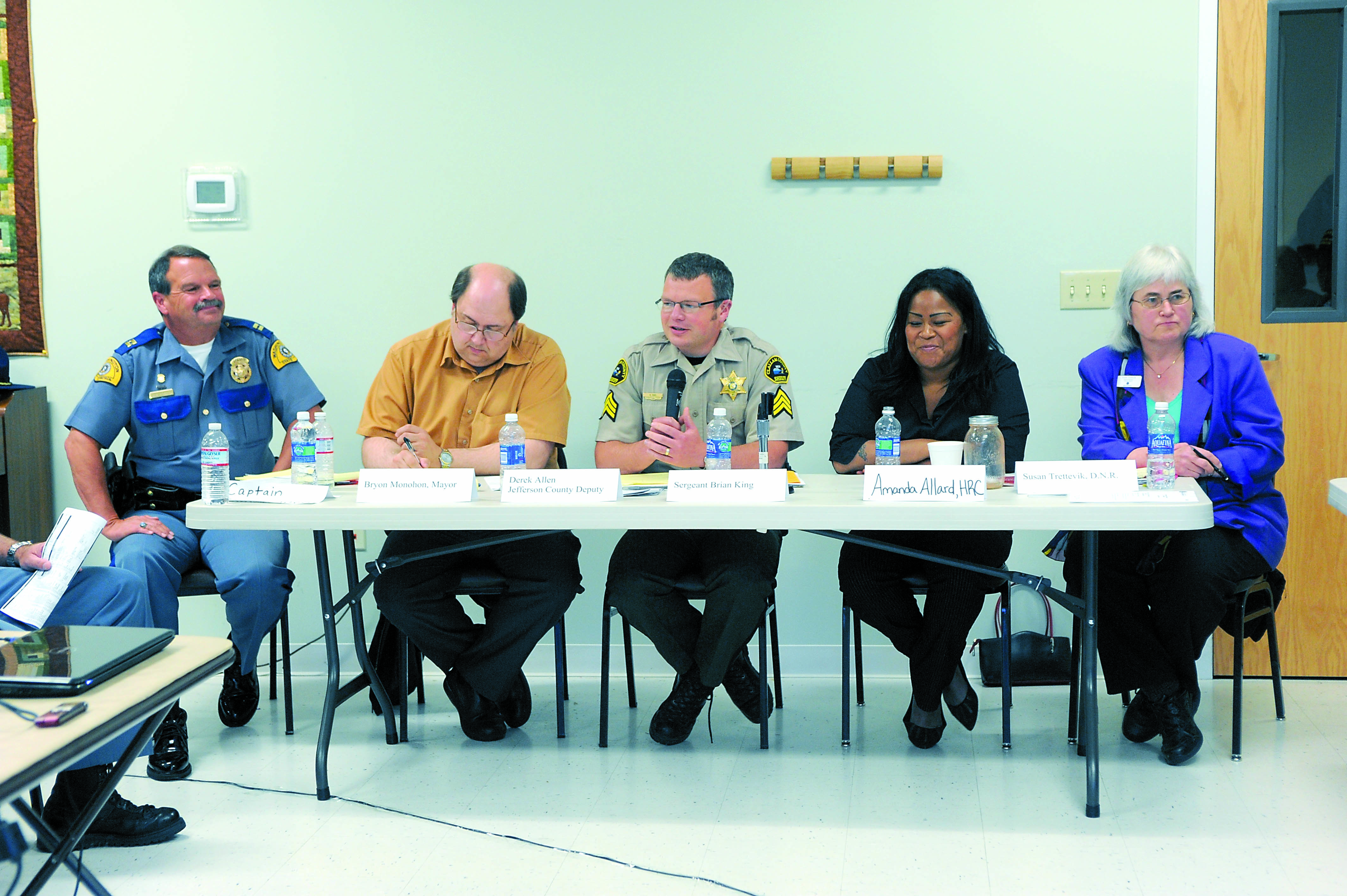FORKS — North Olympic Peninsula law enforcement officials and Mayor Bryon Monohon sought to assuage the fears of members of the West End Latino community regarding interactions with the Border Patrol at a Friday night panel discussion and meeting of the state Commission on Hispanic Affairs.
The officials told more than 80 people at the Forks Community Center that they rarely use the Border Patrol for translation assistance during investigations and traffic stops.
They spoke in response to more than an hour of public comments and questions posed at the meeting.
“It’s very rare that the Sheriff’s Department uses any Border Patrol services,” said West End-based Sgt. Brian King of the Clallam County Sheriff’s Office.
“We really, truly want to maintain that trust with the community,” King said.
“The situation here with the Border Patrol presence certainly inhibits our ability to conduct investigations when dealing with the Hispanic community and their mistrust,” he added.
The state Commission on Hispanic Affairs is appointed by the governor to advise the governor and state Legislature, and “advises our Congressional delegation on the necessity of a comprehensive immigration reform,” according to its mission statement at www.cha.wa.gov.
The commission’s presence in Forks was requested by the Forks Human Rights Group, a West End organization that monitors and documents Border Patrol activities by photographing, videotaping and recording traffic stops conducted by the agency.
More than a dozen in the audience made comments and asked questions of a panel that included Monohon, King, investigator Amanda Allard of the state Human Rights Commission, Olympic Region Manager Susan Trettevik of the state Department of Natural Resources and District 8 Capt. Robert Johnson of the State Patrol, whose Bremerton detachment covers the North Olympic Peninsula.
Commission Chairwoman Lillian Ortiz-Self said Jefferson County West End Deputy Derek Allen, who was not present, had been scheduled to attend.
A Border Patrol representative was not invited for fear the largely Latino audience would feel intimidated by the agency’s presence, Ortiz-Self said.
“The purpose was to engage law enforcement to continue to provide services to the community,” she said.
The Border Patrol “has an open line of communication with representatives within the community in Forks,” Blaine sector Border Patrol spokesman Jeffrey Jones said in an earlier interview.
The agency “has attended meetings in Forks in the past when invited,” he added.
The Border Patrol has become the focus of increasing scrutiny in federal court and, in particular, the West End and Port Angeles, where a new $10 million headquarters is being built to house as many as 50 agents.
The number of Border Patrol agents covering Clallam and Jefferson counties has grown from four in 2006 to 42 as of February.
A federal lawsuit was filed in April by the American Civil Liberties Union and Northwest Immigrant Rights Project, who want to bar the Border Patrol from doing traffic stops on the North Olympic Peninsula, saying the stops are being made without reasonable suspicion that crimes are occurring.
About a week after the suit was filed, the Northwest Immigrant Rights Project filed a complaint with the federal departments of Justice and Homeland Security outlining concerns over the use of Border Patrol agents who provide translation services to law enforcement and end up questioning the individuals — and sometimes arresting them for immigration violations.
Panelists Friday night said some in the Latino community were reluctant to call law enforcement to report crimes such as domestic violence and sexual assault for fear a Border Patrol agent would show up and question those reporting crimes about their U.S. citizenship status.
Monohon said Forks police officers must use “whatever resources are immediately available to them” but that translation services and a “language line” usually suffice.
Forks police officers use Border Patrol translation assistance “two or three times a month,” he said.
Sometimes when the Border Patrol does show up unannounced — the Border Patrol has access to North Olympic Peninsula law enforcement frequencies — “we have to shoo them away,” Monohon added.
Johnson said the State Patrol does not use the Border Patrol for translation assistance.
The officials said their agencies do not have written policies on what they do if the Border Patrol shows up unannounced while a local law enforcement agency is conducting an investigation.
“The establishment of [a policy] would be hotly debated and very controversial in the community,” Monohon said.
The law enforcement officials said it is common practice for various agencies, including the Border Patrol, to stop at the scene of a traffic stop to provide assistance to a law enforcement colleague, just in case it’s needed.
“We’re there to back each other up,” said State Patrol Sgt. Gailin Hester, who is stationed in Port Angeles.
“It’s just common practices of law enforcement.”
The eight members of the commission stayed in Port Angeles on Friday night and met Saturday for a closed-door meeting at Peninsula College, Ortiz-Self said Saturday.
She said Friday a main topic would be how the educational system should deal with the trauma experienced by Latino children whose families are torn apart when one — or both — parents are arrested and incarcerated for immigration violations.
That trauma was a common theme among members of the audience who made comments Friday night.
“I have seen a lot of pain and suffering when parents have been detained and deported,” said preschool teacher Manuela Velasquez of Forks.
“There is nothing in the schools that can help our children that go through that trauma of losing their moms and dads.”
Trettevik said the fear among children in school about being deported has spread to non-Latino youngsters such as her two children, whom she said she adopted from China.
“They came home and said, ‘Mom, can they take us away from you?’ It does ripple out.”
________
Senior Staff Writer Paul Gottlieb can be reached at 360-452-2345, ext. 5060, or at paul.gottlieb@peninsuladailynews.com.

